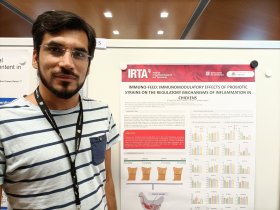Muzahir Hussain


PhD Programme: Nutrition and Metabolism
Research group: MOBIOFOOD – Molecular Bioactivity of Food
Supervisors: Esther Rodríguez Gallego & Joan Tarradas Font (IRTA)
Bio
Muzahir Hussain received a Bachelor Degree in Food Science and Technology from The University of Agriculture Peshawar, Pakistan in 2016, and he obtained his Master Degree in Food Science and Engineering at Nanjing Agricultural University, Nanjing China. He was awarded with a competitive and merit based Chinese Government Scholarship (CGS) for his stay in China for his master degree. During his master degree he worked for 3 years in the Food Nutrigenomics and Meat Nutrition Research Group at National Centre of Meat Quality and Safety Control, Nanjing Agricultural University, Nanjing China. During his stay he focused on Investigating effects of dietary protein diets from different meat species and products on host's (C57BL6/J Mice) gastrointestinal physiology, colonic health, immune system, intestinal barrier functions and the key mechanisms involved in health and diet induced obese disease conditions. From his research he published 2 SCI Q1 research articles as first author in the well known RSC Journal Food and Function, and several other co-authored articles with group members. From September 2021, He is enrolled as a PhD fellow at the URV’s Departament de Bioquímica i Biotecnologia, in the project "Assessment of the immunomodulatory effects induced by probiotic strains (as an alternative to antibiotics) on the regulatory mechanisms of inflammation and tolerance in birds (IMMUNO-FEED)" at MOBIOFOOD research group. His current research interests include intestinal inflammation, intestinal immunity and use of probiotics as an alternative source to antibiotics.
Project: Inflammation and autophagy in the gut: searching for new therapeutic targets in unhealthy ageing
The proces of ageing is a natural event but healthy aging is not allways assured, leading to comorbilities such as cardiovascular disease and obesity. Nowadays, aged populations are a hallmark of developed societies and old people often become sedentary and prone to adopt poor nutritional habits. Therefore, given that obesity in the elderly is a serious concern, the comprehension of the key mechanisms of ageing and age-related diseases has become an essential matter. During ageing, chronic low-grade inflammation, the so called inflammageing, has been suggested to contribute to ageing derangements, including intestinal functions. In addition, one of recent focus in tackling obesity is the study of intestinal dysfunction due to, according to animal and human studies, obesity is characterized by altered gut microbiota, inflammation and gut barrier disruption. However, the specific changes of the inflammatory state along the intestine are still unknown. A relationship between inflammation, autophagy and the ageing has been pointed out. Numerous studies have highlighted the critical role of autophagy in limiting inflammatory response and in the intestinal homeostasis maintaining intestinal barrier, anti-microbial defence and mucosal response. Moreover, it has been described that malfunctioning autophagy plays an important role in age-related pathophysiology, but the underlying mechanisms are not been fully understood. In this context, studies on natural food compounds have drawn increasing attention. Our previous studies in rodents indicate that treatments with proanthocyanidins, the most abundant polyphenols in human diet, act as preventives against metabolic distortions induced by an obesogenic diet. These healthy effects are observed on general aspects such as body weight, adiposity but also on intestinal functionality. Therefore, given this challenging metabolic context, understanding the role of autophagy in intestinal homeostasis, the pathogenesis of inflammation and the possible effects of proanthocyanidins could lead to the development of new strategies in prevention and/or treatment of intestinal diseases.
Outreach activities
- European Researchers' Night 2021: “Al nostre budell també li agraden els insectes, els oblidats de l'hort”.
- European Researchers' Night 2023: "El gust més avall de la boca".
International secondment
- University of Copenhagen, Denmark. 3 months (2022).
News
- Diari Digital de la URV. Interview: In a few years, antimicrobial resistances will be the first cause of death in the world



